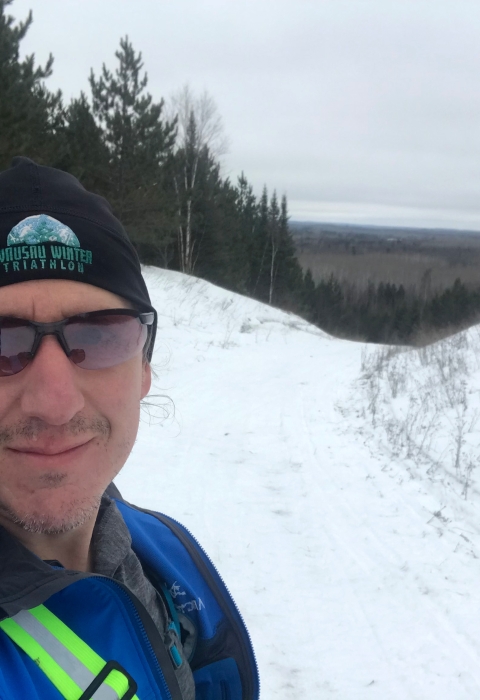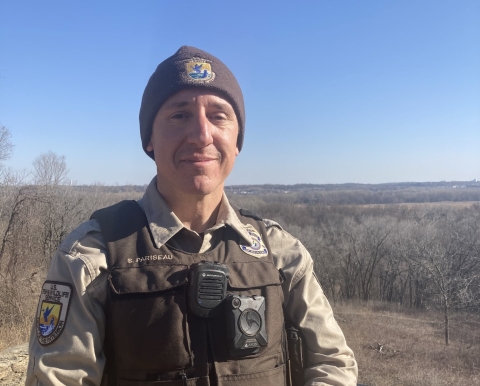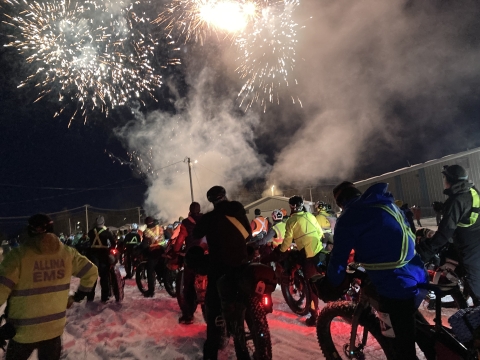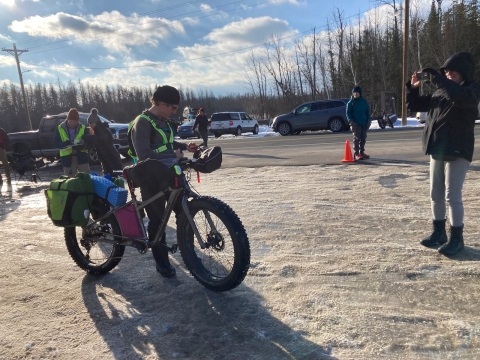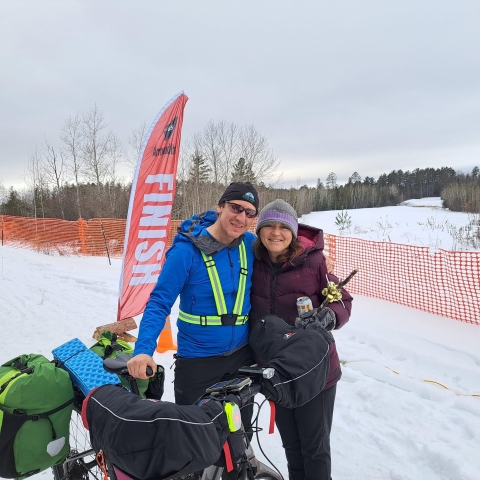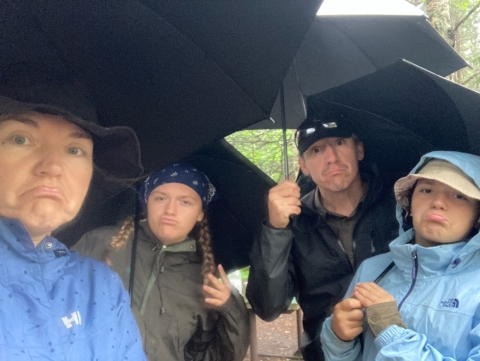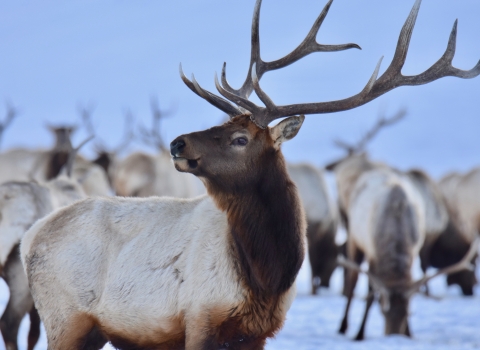In his career as a federal wildlife officer with the U.S. Fish and Wildlife Service, based at Minnesota Valley National Wildlife Refuge, Scott Pariseau has had ample opportunity to step outside his comfort zone. Confronting crime suspects. Investigating suicides. Working with homeless people. Managing stress.
But he’s never tested his physical and mental limits the way he did in January 2024 when he entered the Arrowhead 135 — an ultramarathon that’s considered one of the world's toughest endurance challenges.
What makes the annual midwinter event so tough? There’s the northern Minnesota cold: Temps can drop as low as minus 48 degrees Fahrenheit. Snowstorms are a routine hazard. The trail — from International Falls to Tower, Minnesota — can be rough. The isolation can get to you. And then there is the race itself: Competitors have 60 hours to bike, ski or walk 135 snowy miles to the finish line. Usually just over half the entrants finish.
This year, Pariseau, 48, was one of them. His 13 years of experience as a federal wildlife officer helped prepare him, he says. More about that in a minute.
Why subject yourself to such an ordeal, you might ask.
“I enjoy setting somewhat outrageous goals and adventures that push my comfort zone,” replies Pariseau.
“I think it is important that we all challenge ourselves … and ‘do hard things.’ It's how we get better, stronger, learn new skills, and become more confident in our abilities. How do you know what you are capable of if you never test your limits?”
If ever he needed that mantra, it was 100 miles into the race — with 35 still to go. Pariseau was on his fat-tire bike, loaded with gear. It was around 4 a.m.
“I had not slept, and I was exhausted. Trail conditions were bad, and it was clear that it was dangerous to continue in the dark. So I pulled over, took out my sleeping bag and bivy sack and slept until the sun came up. The two hours of sleep reinvigorated me.”
He had it worse in a qualifying race — an 80-miler in northern Wisconsin. “At minus 20 degrees, my water bladder froze. I burned my lip on boiling water from a thermos, spilling water on myself in the process. Then my bike chain fell off.”
Adopting a Fitness Habit
Pariseau insists he is not a natural-born super athlete. He played hockey in high school. For two decades since, he’s been plagued by chronic lower back pain. He’s had back surgery — twice.
Partly in response, and partly to meet his duties as a federal wildlife officer, he turned to exercise. “I generally tried to keep healthy and fit. I found daily short outings, jogging, hiking, or walking one to two miles, or cross-country skiing in the winter, would keep my back pain manageable.”
In 2016, he applied to become a member of the regional Federal Wildlife Officer Health and Fitness team, thinking his knowledge of managing chronic back pain through exercise could help his fellow officers. He almost didn’t make it through training, barely meeting the fitness standards for instructors.
His response: A resolve to take health and fitness more seriously.
In 2020 the Covid pandemic and community anger toward law enforcement after the murder of George Floyd tested that resolve. “The tension was affecting my mental health. I was not dealing with it well, losing my temper, unable to deal with little frustrations, and generally being impossible to live with; just ask my wife and kids. “
He looked to exercise to burn off the stress. One day after work, he went for a run and ended up going 13 miles, surprising himself. That fall, he signed up for his first trail run — a half marathon. He bought a fat-tire bike and decided to enter and complete the Arrowhead 135 on it.
Officer Training: A Plus
Pariseau had an advantage in the Arrowhead 135: his training as a federal wildlife officer.
He explains: “Our jobs can be very strenuous, working long days in the field, hiking miles off trail through a variety of rugged refuge lands, hauling gear and equipment. It definitely takes strength and endurance. Most federal wildlife officers have very large patrol areas. Even though I work in an urban refuge, my patrol area covers over 18 counties in Minnesota and Wisconsin, and I spend many hours working alone, traveling between Refuge System lands I am responsible to patrol.”
Federal wildlife officers also receive training in outdoor survival, search and rescue, and emergency tactical medical skills.
Pacing yourself and being alert to what your body is telling you are also key to both job and race performance.
During race events, says Pariseau, that means dealing with problems before they get out of control. “Feel a hot spot on your toe? Better stop and fix it before it becomes a full-blown blister. Have you been fueling and drinking appropriately? If not, there is a good chance you are going to bonk, cramp, and not be able to finish the race. Feet or hands cold? Better fix it before you get frostbite and have to quit.”
On the job, self-awareness can also save lives.
“As a law enforcement officer, the ability to focus on the task at hand, better identify distracting emotions like anger or irritations, or even identify my biases, will likely make me safer and allow me to effectively do the job.”
Pariseau says meditating helps him recognize negative, self-defeating thoughts — “the voice in your head saying, You’ll never finish. What are you trying to prove?”— for what they are. “They are only thoughts, I have some control over them, and I can choose to just let them pass or act on them. It's my call.”
The Next Adventure
Now that he’s completed the Arrowhead, what’s Pariseau’s next challenge?
Maybe he’ll ski the course. Maybe he’ll try the Iditarod. Stay tuned.
"Going forward, I’m confident there will be opportunities for more ‘Arrowheads’ in my federal career and personal life. Whenever I get the feeling that something will be hard and uncomfortable, I hope I recognize it as an opportunity and give it a try.”
Oh, and how did he feel at the finish line?
“Proud. Happy to see my wife waiting. Exhausted. Grateful to get off the bike. Excited by the thought of beer, a burger, and french fries. And honestly, sad the race was over. It was overwhelming.”
Q & A with Scott Pariseau
Interview Excerpts
How did you feel on completing the race?
It felt empowering to complete the race, knowing I had accomplished the goal I started pursuing three years prior. When I first heard about the race, it seemed like some mythical event "known as one of the 50 hardest races on earth." Many people underestimate what they are capable of accomplishing. I hope to continue to prove myself, or at least prove those pesky [doubts] wrong.
What inspired you to run the Arrowhead 135?
...At Minnesota Valley National Wildlife Refuge.... I had encountered numerous refuge visitors utilizing our trail system as part of their training for ultra-distance events. I was intrigued by their stories of hardships, extreme cold temperatures, isolation, and the physical and mental endurance needed to complete the events. This made me wonder if finishing an ultra-distance event was within my capabilities.
How long did you train? What was involved?
Getting into the Arrowhead 135 requires finishing a qualifying event. Finishing a 100-mile foot race, off-road bike race, or cross-country ski event, or a 200-mile road bike race will generally qualify you for entry. ..The easiest path for me was to start with a similar winter ultra race — the Tuscobia 80 mile, then the following year finish the Tuscobia 160 mile, which is a qualifying race for Arrowhead 135. So, I had my 3-year plan.
The physical training ...generally involved long, one-to-two-hour, low-intensity (conversational) efforts jogging or biking, mixed in with some strength training and the occasional short hard run or bike effort.
How else did you prepare?
Winter ultra events occur no matter what the weather. ..Often that means sub-zero temperatures. In 2019 the Arrowhead 135 had wind chills of minus 55 degrees Fahrenheit and real temps of minus 40 degrees. ...You need to acquire gear and have systems set up for your survival. The Arrowhead mandatory gear list includes a minus-20-degree-Fahrenheit sleeping bag or colder rating, bivy sack or tent, satellite tracker, stove, insulated water container (keeping your drinks from freezing in a cold year is a real challenge), and a day’s worth of readily edible food at all times (3,000 calories — many foods will freeze solid and not be edible).
The gear requirements help ensure in the event of an emergency (blizzard, injury, etc.) you should be self-sufficient for a day until rescue is an option. It's important that your clothing system effectively manages sweat. You do not want to work up a big sweat to find yourself becoming wet and hypothermic when the temps drop to minus 20 at night. Assembling and testing gear and clothing systems was a three-year process of trial and error. The races leading up to the Arrowhead allowed me to fine-tune my gear and improved my mental and physical endurance.
How does mindfulness help you as a federal wildlife officer?
In life we are subjected to many different obstacles and stressors that can build up and negatively affect our performance at work and the relationship with our friends and families.
I sometimes don’t deal with the stress of life and work in a healthy way... When I first recognized I had a problem I needed to “fix” during the 2020 turmoil engulfing our community, I focused on exercise and better nutrition.
I also started a practice of mindfulness meditation. I found it very helpful for relieving stress and for identifying the early signs of a problem. I became more aware of how I was feeling physically and emotionally. ...A simple daily 10-minute mental exercise for my brain...did for me what the science said it would: It increased my concentration and focus, reduced unhealthy emotional reactivity (anger, irritation and frustration), and reduced my stress. Through this simple brain exercise, I became more aware of what I was feeling and the intrusive, unhelpful thoughts we all have running through our heads.
Do other skills apply to both your job and ultramarathons?
Another correlation between work and ultras is the recognition that you need to play the long game. You can only sprint from the starting line for so far before burning out, and if you are not careful to pace yourself, you may not be able to finish the race, or you’ll be so wrecked you will have to hobble and drag yourself across the second half of the race course. I think many people are so passionate about their career there is a real danger of burnout, or the realization at retirement that they had neglected family and friends.
Do you know what long-distance endurance events, specifically biking, and our careers have in common? Sometimes it's a pain in the butt, but you just have to keep moving forward!
Why do you think it is important to take on challenges and “do hard things”?
... When on a100-mile backpacking trip with my teenage daughters, there were some very hard long days. A couple days it rained nonstop. .. I told my daughters, “Yes, this is hard! But this is going to be one of the easiest hard things you do in life.”
I think navigating through life, trying to be a good kid, spouse, parent, friend, employee, citizen, is a much harder task... But doing hard things can improve our skills at the rest of life. Ultimately, I think taking up what seems like an outrageous endeavor, to push your comfort zone, sometimes failing, sometimes succeeding, but always learning, enriches life satisfaction and happiness.
Has running an ultra-marathon inspired you to set bigger goals?
I hope to never stop trying to challenge myself to do hard things. It doesn’t have to be a physical endeavor. It's really about just doing new things, learning new skills. Maybe I should learn how to play a musical instrument, or learn to how to sail, or take a trip to Europe. I’ve never been across the Atlantic. ...Maybe I’ll do something that feels very vulnerable, like put my thoughts on paper about doing hard things, for people I don’t know to possibly read.
After completing these races, the mileages just don’t sound as intimidating as they once did. ... I would like to give a 100-mile trail run a try. Now that I've completed the Arrowhead 135 by bike, I would also like to attempt it on foot or by ski. I hope to get into the 350-mile Iditarod Trail Invitational (ITI) in Alaska in 2025, and maybe someday line up at the start of the 1,000-mile ITI.
What do you see as your “Arrowhead” in your career as a federal employee?
My federal career has been a series of “Arrowheads.” I've had the opportunity to take up projects that challenged me. Even at the very beginning of my career, I was hesitant to start down the path of becoming a law enforcement officer, not even sure I had the right temperament or ability to do the job. Overcoming imposter syndrome to become an instructor in various disciplines, despite sometimes not feeling very confident about my abilities. Building up the courage to instruct a roomful of Federal Wildlife Officers about the benefits of meditating...which I was afraid would not be well perceived... Going forward, I’m confident there will be opportunities for more “Arrowheads” in my federal career and personal life, and whenever I get the feeling that something will be hard and uncomfortable, I hope I recognize it as an opportunity and give it a try.
